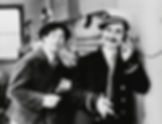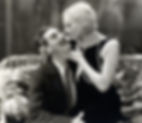Monkey Business (1931)
- Soames Inscker
- May 6, 2025
- 4 min read
Updated: Jun 7, 2025

Introduction
Monkey Business (1931) is the third feature film starring the inimitable Marx Brothers and their first to be based on an original screenplay rather than an adaptation of a Broadway stage production. Directed by Norman Z. McLeod and written by S.J. Perelman and Will B. Johnstone, this anarchic comedy marks a critical transition for the brothers—from musical vaudevillians to full-fledged cinematic troublemakers. The result is a brisk, chaotic, and wildly inventive film that helped define the Marx Brothers’ screen personas and solidified their place in early sound-era comedy.
Plot Summary (Loose as It Is)
The "plot" of Monkey Business is characteristically flimsy, serving mainly as a framework for the brothers' madcap routines. The film opens aboard a transatlantic ocean liner where the Marx Brothers (unnamed in this film, playing essentially themselves) are stowaways hiding in barrels. The opening sequence—with the brothers all doing impressions of Maurice Chevalier to impersonate a single passport—immediately signals the film’s commitment to absurdism over narrative logic.
As they roam the ship, each brother causes mayhem in his own way: Groucho wisecracks his way into the captain's good graces (and his daughter’s affections), Chico and Harpo involve themselves with rival gangsters, and Zeppo plays a surprisingly prominent role as the romantic lead, wooing the daughter of a mob boss.
Once the ship docks, the plot shifts into a gangster subplot involving rival mobs, a kidnapped girl (Thelma Todd as Lucille), and the Marxes stumbling into the middle of it all. Chaos ensues.
Characters and Performances

Groucho Marx
Groucho is the verbal engine of the film. His quips, double entendres, and sarcasm dominate every scene he’s in. His timing is razor-sharp, his delivery fast and furious. As in later films, Groucho represents a kind of gleeful intellectual subversion—he is both the smartest and the most ridiculous person in the room.
Chico Marx
Chico provides his usual blend of street-smart wit and mangled English. His accent and puns are played to maximum comic effect, and his interplay with Groucho, especially in insult-laden back-and-forths, remains one of the film’s most enduring pleasures.
Harpo Marx
Harpo remains a silent, chaotic force of nature. His physical comedy and pantomime are brilliant, with routines involving scissors, stolen hats, and slapstick gags that would make Buster Keaton proud. His expressive face and body language compensate entirely for his silence—and often steal the spotlight.
Zeppo Marx
Often regarded as the “straight man” of the group, Zeppo is actually given more agency here than in later films. As the romantic lead, he’s charming, though undeniably less comedic than his brothers. Nonetheless, his presence anchors the film’s more structured elements (such as they are).
Thelma Todd as Lucille Briggs
Todd brings a sharp comedic sensibility and glamour to the proceedings. She serves primarily as Groucho’s foil and love interest, providing both romantic allure and a contrast to the Marx Brothers’ madness.
Direction and Style
Norman Z. McLeod directs with a light touch, keeping the camera moving enough to accommodate the rapid-fire pacing of the Marxes’ jokes. Monkey Business is more cinematic than their earlier films (The Cocoanuts and Animal Crackers), with smoother editing and a better sense of timing. The film also benefits from its dynamic shipboard setting, allowing for more varied and visually interesting backdrops.
Yet the film’s real style comes not from the direction, but from the brothers themselves. Their brand of comedy—vaudevillian, unfiltered, and barely tethered to the plot—transcends conventional narrative form. The fourth wall is routinely brushed aside, logic is irrelevant, and everyone is fair game for ridicule.
Highlights and Classic Scenes
Maurice Chevalier Impersonation Scene: Each brother trying (and failing) to pass through customs by singing "You Brought a New Kind of Love to Me" in a Chevalier impression is one of the film’s most famous sequences.
Harpo’s Scissors Antics: Harpo gleefully cuts everything from a man’s tie to a gangster’s coattail, offering a masterclass in destructive physical comedy.

Groucho’s Wordplay: Virtually every scene Groucho is in is stuffed with unforgettable lines. One of the best:
“You know, I’d do anything for you. I’d even get up early.”
The Swordfight with Gangsters: In a climactic moment of absurd heroism, the brothers foil a gangster plot with complete ineptitude and accidental brilliance.
Themes and Subtext
Anti-Establishment and Authority Subversion
Like much of the Marx Brothers’ work, Monkey Business is a satire of authority figures—from ship captains to gangsters to customs agents. The brothers delight in dismantling systems, rules, and etiquette with reckless abandon. No one is too powerful to mock.
Immigrant Identity and Outsider Humour
Chico’s exaggerated Italian accent and Harpo’s silent persona reflect the brothers’ immigrant heritage and vaudeville roots. Their comedy often centres around being outsiders poking fun at the social order they were never fully welcomed into.
Pre-Code Liberties
The film is full of pre-Code innuendo, suggestive jokes, and flirtatious humour, particularly in Groucho’s scenes with Thelma Todd. This adds a risqué charm that would be dialled back in post-Code films.
Cultural Impact and Legacy
Monkey Business is often cited as one of the Marx Brothers’ finest films, even though it lacks the polish and narrative cohesion of Duck Soup (1933) or A Night at the Opera (1935). What it lacks in story, it makes up for in energy, unpredictability, and pure comedic invention.
It was a box office success and further cemented the Marx Brothers as major stars of early sound comedy. It also contributed to defining the parameters of anarchic comedy—paving the way for the likes of Monty Python, Airplane!, and modern-day absurdist comedians.
Criticisms
Weak Plot: Even by Marx Brothers standards, the story is extremely loose. Viewers expecting a coherent narrative may find the film meandering or even frustrating.
Zeppo’s Romance Arc: Though he has more to do here, Zeppo’s storyline feels superfluous compared to the zaniness elsewhere.
Some Dated Humour: Like many pre-Code films, there are jokes that may now feel dated or culturally insensitive by modern standards.
Conclusion
Monkey Business is a riotous, surreal rollercoaster that thrives on speed, wit, and comic chaos. It’s the Marx Brothers unbound—untethered from stage roots, free to roam a cinematic playground with complete abandon. Though it may lack the satirical sharpness of Duck Soup or the structural finesse of their MGM years, Monkey Business is a quintessential expression of early sound-era comedy.
For fans of slapstick, wordplay, and the joy of total comedic freedom, it remains a must-see.
The film doesn’t aim for coherence—it aims for laughter, and hits the target with relentless, chaotic precision.



